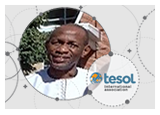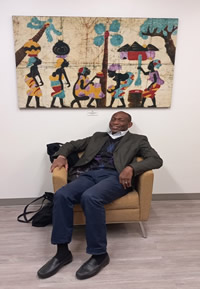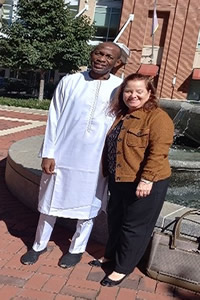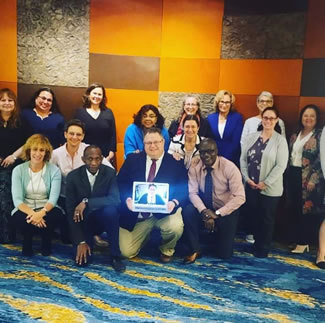|
 I’m writing this article to invite all TESOL members to be
fully engaged. I want to encourage all the undecided to go the extra mile: Help
the organization grow and better shine by taking up leadership positions, which
are open to all TESOL members and inclusive of all races, ethnicities,
nationalities, language backgrounds, disabilities, health/medical conditions,
ages, religions, genders, gender identities, and sexual orientations. I’m writing this article to invite all TESOL members to be
fully engaged. I want to encourage all the undecided to go the extra mile: Help
the organization grow and better shine by taking up leadership positions, which
are open to all TESOL members and inclusive of all races, ethnicities,
nationalities, language backgrounds, disabilities, health/medical conditions,
ages, religions, genders, gender identities, and sexual orientations.
TESOL wishes to offer many more opportunities to
its members and continue to advance the field and increase the association’s
assets. It’s important to understand that by assets, I
don’t mean only finances—but rather the association’s
valuable people, from executive director, staff, board members, and committee
members to all its volunteers.

Sitting in the TESOL central office beneath artwork (African women at work in rural areas) gifted to TESOL by the Association of Teachers of English in Senegal.
I am the living example of an ordinary member: I
come from a very poor country and have nothing special about myself but my love
and passion for teaching English, my dedication to the field, and my dreams of
a better, stronger, and more sustainable association. In this column, I would
like to focus mainly on my experience as a first-year TESOL board of directors
member, including challenges and the perspectives we embraced to fully recover
from the COVID-19 pandemic.
Beginning My Board Journey
My participation on the TESOL board has led me on a
wonderful adventure. I never dreamt of joining the TESOL board, even when I
volunteered for TESOL many times over the years: during its international
symposium in Dakar, Senegal; for the Franklin Global SpellEvent (coordinator);
the 50th TESOL anniversary committee; and also my pivotal role in partnerships
with affiliates, such as Washington, D.C., Area TESOL (WATESOL), Maryland TESOL
(MDTESOL), and my own affiliate, Association of Teachers of English in Senegal
(ATES).
One evening, while dining with a former TESOL
president, we were discussing the association. I stated some frustrations I had
as an international member and shared some ideas and dreams I had for the
organization. After listening to me, my colleague asked, “Why don’t you apply
to become a board member?”
My answer was negative at first; to me, it seemed
impossible to be elected. At that time, no African had ever joined the TESOL
board of directors. However, thanks to his pep talk, I applied. I was
shortlisted, but I was not elected in the final round. I didn’t give up—after
my second application, I received a call from then Executive Director Rosa
Aronson, who announced the good news. I’d been elected!
Feeling out of Place
Actually, being a board member involves a lot of
responsibilities and duties. It’s no doubt one more challenge in my
professional career. The biggest shock stems from the amount of information,
data, meetings, assignments, and paperwork to be dealt with. Additionally, my
first year on the board coincided with a COVID-19 year. The association, like
many organizations at the beginning of the pandemic, was going through
difficult times. Having just started my term, I acted first as an observer; I
attended online meetings without feeling I had the right to intervene.
The atmosphere, the solemnity, and the meeting
protocols made me believe at first that I was out of place. The environment
felt as foreign to me as if everyone else were from the planets Mars or Jupiter.
To complicate matters, I had no idea what the multiple acronyms being used
meant!
Another new experience for me was attending the
first virtual TESOL convention. In spite of some initial challenges, the
convention went smoothly and I will never forget the speech delivered by then
TESOL President Deborah Short, which not only summarized the pandemic situation
with its challenges and setbacks, but encouraged all TESOLers—specifically the
board, staff, volunteers, and members—to be one to overcome COVID-19 challenges
and keep the association viable and healthy. She summoned all ELT professionals
to deal with this new paradigm and stay innovative and creative in order to
keep up with the new trends of Zoom classes, Google classrooms, and other
edtech to address the needs of our learners. She emphasized that it was key for
us to change our classroom practices or disappear forever. TESOL itself had
embraced this idea, having canceled its in-person annual convention and, for
the first time ever, hosting a virtual convention.
Finding My Place
Amidst all the Zoom board meetings, which had taken
the place of in-person meetings because of the pandemic, the existing board
members welcomed the newcomers so warmly that I told myself that I didn’t dare
give up my position. Also, there was no way I could disappoint my friends and
colleagues, who had offered so much excitement and expectations.
My mentor, Debra Suarez, also played a great role
in my regaining confidence. So, I started calming down and telling myself that
challenges are ahead for all people, and that no matter what position or
experience you have had in life, there are always times and occasions that we
need to use our commitment and determination to get through some complex
situations.

Photo with my mentor, Debra Suarez.
During subsequent board meetings, when there were
acronyms used or concepts discussed that I was unfamiliar with, I started
asking lots of questions. As the Russian proverb states, “There is no shame in
not knowing; the shame lies in not finding out.” In the end, I helped raise
awareness about simplifying and decoding concepts that people would take for
granted simply because they lived in the United States. In my capacity as a
board member from an underprivileged and underrepresented area, I began
striving to get TESOL to reach out to more people and places in the world.
Today, with its DEIA (Diversity, Equity, Inclusion, and Access) initiative, the
organization is making greater efforts to have a more diverse association. In
fact, the TESOL board had its most diverse membership in its history: It had
board members from Nigeria, Senegal, Honduras, Argentina, Denmark, the Czech
Republic, France, and the United States.
Conclusion
My dream today is to inspire millions of people
around the world to join TESOL International Association, become active
members, and then take up leadership positions. As the saying goes: “We can
soar on the wings of an optimistic attitude.” Each person can make a difference
from all the parts of the world and have a meaningful footprint in the
association’s management.
TESOL is a big family with great heart and, no
matter what, many people will remain faithful to the association. Whenever
there is an event, we can see the longstanding members who attend and give
their unremitting support. Whenever something is needed, such as when there is
a new committee created to solve an issue or address an important topic, or
when an interest section needs revitalization, volunteers step up. It is just
amazing to see that whenever there is a problem, it can’t contend with the
dynamism, commitment, and passion of our extraordinary members.

Several members of the TESOL board and staff
(October 2021).
Glenda Gallardo, a TESOL reviewer, sums up
volunteering for TESOL well. She states on her Facebook page that there are
many advantages to volunteering for TESOL, but “most importantly, you feel
connected to TESOL.”
The heart of TESOL is its volunteers. I
would love to one day have a TESOL Hall of Fame displayed at all our annual
conventions to help celebrate TESOL’s most devoted members and recognize the
inspiration they provide to entire generations. Such recognition, through a
TESOL Hall of Fame, might be the ultimate recognition of the association to its
pillars: The long-time volunteers and devoted members who sustain the
organization through the introduction, over time, of challenges and new
paradigms.
Dr.
Mawa Samb, Fulbright Exchange Teacher, is
currently a teacher trainer and instructor at the English Language Institute.
He is also a consultant for the Lauder Institute Immersion Program of
Pennsylvania University, the British Council, and the West African Economic and
Monetary Union Baccalaureate exam. He also teaches at Ecole Supérieure
Polytechnique de Dakar in the IT Department. Former Association of Teachers of
English in Senegal president, he has also served TESOL International
Association in various capacities and won a 2016 TESOL Professional Development
Travel Grant for Practicing ESL/EFL Teachers.
|